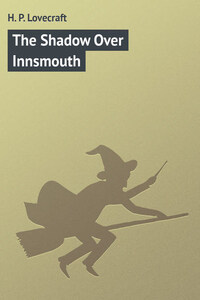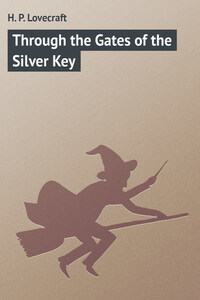It was a lonely and deserted country, but at last I spied a roof among a clump of trees near the small river on my right; perhaps a full half-mile from the road, and probably reachable by some path or drive which I would presently come upon. In the absence of any nearer dwelling, I resolved to try my luck there; and was glad when the bushes by the roadside revealed the ruin of a carved stone gateway, covered with dry, dead vines and choked with undergrowth which explained why I had not been able to trace the path across the fields in my first distant view. I saw that I could not drive the car in, so I parked it very carefully near the gate – where a thick evergreen would shield it in case of rain – and got out for the long walk to the house.
Traversing that brush-grown path in the gathering twilight I was conscious of a distinct sense of foreboding, probably induced by the air of sinister decay hovering about the gate and the former driveway. From the carvings on the old stone pillars I inferred that this place was once an estate of manorial dignity; and I could clearly see that the driveway had originally boasted guardian lines of linden trees, some of which had died, while others had lost their special identity among the wild scrub growths of the region.
As I ploughed onward, cockleburrs and stickers clung to my clothes, and I began to wonder whether the place could be inhabited after all. Was I tramping on a vain errand? For a moment I was tempted to go back and try some farm farther along the road, when a view of the house ahead aroused my curiosity and stimulated my venturesome spirit.
There was something provocatively fascinating in the tree-girt, decrepit pile before me, for it spoke of the graces and spaciousness of a bygone era and a far more southerly environment. It was a typical wooden plantation house of the classic, early nineteenth-century pattern, with two and a half stories and a great Ionic portico whose pillars reached up as far as the attic and supported a triangular pediment. Its state of decay was extreme and obvious; one of the vast columns having rotted and fallen to the ground, while the upper piazza or balcony had sagged dangerously low. Other buildings, I judged, had formerly stood near it.
As I mounted the broad stone steps to the low porch and the carved and fanlighted doorway I felt distinctly nervous, and started to light a cigarette – desisting when I saw how dry and inflammable everything about me was. Though now convinced that the house was deserted, I nevertheless hesitated to violate its dignity without knocking; so tugged at the rusty iron knocker until I could get it to move, and finally set up a cautious rapping which seemed to make the whole place shake and rattle. There was no response, yet once more I plied the cumbrous, creaking device – as much to dispel the sense of unholy silence and solitude as to arouse any possible occupant of the ruin.
Somewhere near the river I heard the mournful note of a dove, and it seemed as if the coursing water itself were faintly audible. Half in a dream, I seized and rattled the ancient latch, and finally gave the great six-panelled door a frank trying. It was unlocked, as I could see in a moment; and though it stuck and grated on its hinges I began to push it open, stepping through it into a vast shadowy hall as I did so.
But the moment I took this step I regretted it. It was not that a legion of specters confronted me in that dim and dusty hall with the ghostly Empire furniture; but that I knew all at once that the place was not deserted at all. There was a creaking on the great curved staircase, and the sound of faltering footsteps slowly descending. Then I saw a tall, bent figure silhouetted for an instant against the great Palladian window on the landing.


















